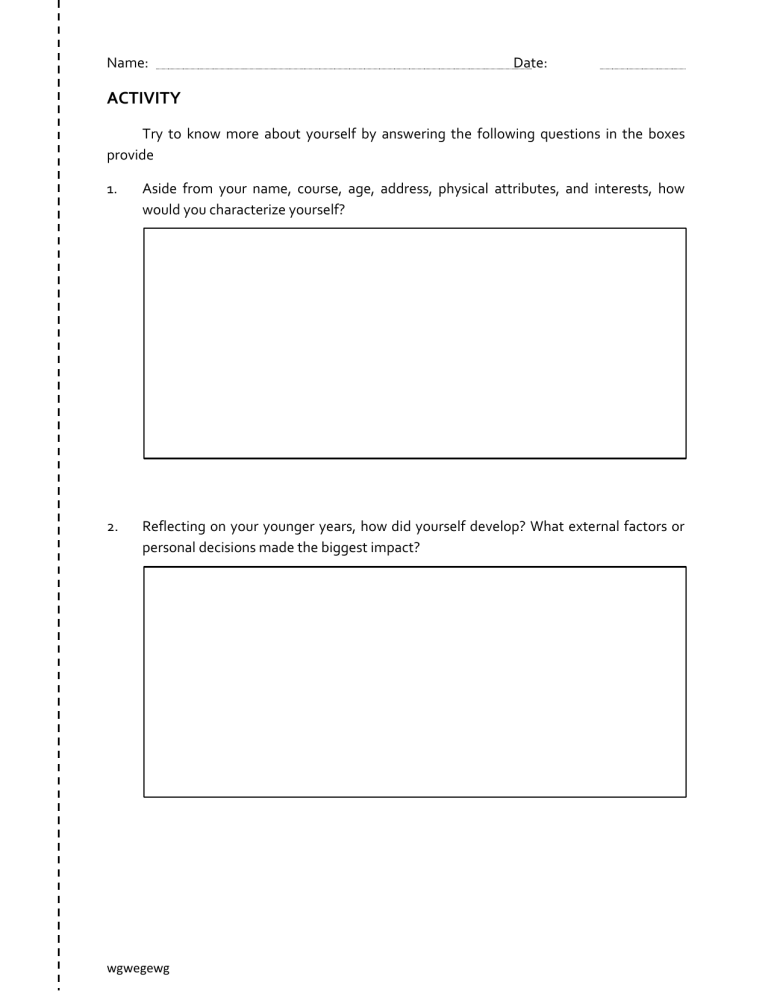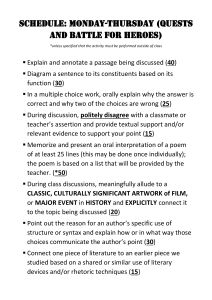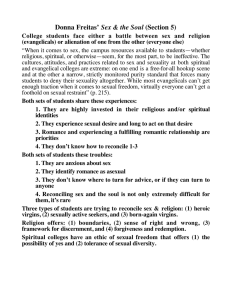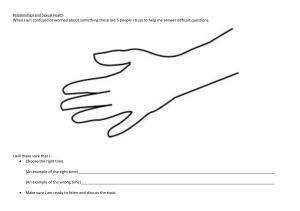
Name: Date: ACTIVITY Try to know more about yourself by answering the following questions in the boxes provide 1. Aside from your name, course, age, address, physical attributes, and interests, how would you characterize yourself? 2. Reflecting on your younger years, how did yourself develop? What external factors or personal decisions made the biggest impact? wgwegewg 3. How is your “self” related to others, and what makes it different from others? 4. What do you think is the connection of your “self” to your physical body? 5. Do you think a separate “self” exists after death? What do you think happens to this entity? ANALYSIS Let us summarize and examine your answers on the previous page through filling in the following diagrams. You are encouraged to share your answers with the class. 1. Based on your answers, how do you view your personal “self” (internal) and its connections to others (external)? Internal 2. External Based on your answers, how do you view the development of the self? The Self In Our Younger Years (From infancy to teenage years? The Self During Adulthood (20 years old and above) The Self After Death From the above activities, were you able to know more about yourself as well as the concept of “self”? Can we truly know about ourselves as well as the selves of others? And, if we at least understand ourselves and others, what can we do with such knowledge? Name: Date: ASSESMENT AND APPLICATION “Invictus,” written in 1875 by William Ernest Henley, is arguably one of the iconic poems ever written that offers a strong message about the meaning of self. A Latin word meaning “unconquered,” its last two lines are notably utilized speeches of the historical figures, like Nelson Mandela, Aung Suu Kyi, and Barak Obama, as well as the other literatures and movies, such as Casablanca, Star Trek: Renegades, as the biopic Invictus. Read the poem and answer the questions. INVICTUS Out of the night that covers me, Black as the pit from pole to pole, I thank whatever gods may be For my unconquerable soul. In the fell clutch of circumstance I have not winced nor cried aloud. Under the bludgeonings of chance My head is bloddy, but unbowed. Beyond this place of wrath and tears Looms but the Horror of the shade, And yet menace of the years Finds and shall fine me unafraid. It matters not how strait the gate, How charges with punishments the scroll, I am the master of my fate, I am the captain of my soul. Name: Date: ACTIVITY Let us do a simple character association. Answer the questions based on you impressions per item in the space provide. Word A Male Teenager A Religious Person What is the commonly expected behavior attitude, or even appearance (i.e., hairstyle, clothes, belongings) of the person? ANALYSIS After answering the activity, reflect on the following guide questions. You can discuss with a classmate or share your answer with the whole class. Please be considerate of each other’s perspective and continue to reflect on your own as this is meant to help you know and understand your “self” better. 1. Write two common ideas among you classmate about the aforementioned characters: a. A male teenage: b. A religious person: c. An artist: d. A mother: e. 2. A student in your course Write one different idea from your classmate about the aforementioned characters: A. A male teenager: B. A religious person: C. An artist: D. A mother: E. A student in your course: Name: Date: ASSESSMENT AND APPLICATION Using a concept map, write down three social institutions that you think have big effects on your concept of you “self.” Then, write down what those effects are (i.e., attitude, behavior, expression, likes and dislikes, beliefs, and so on). Social Institution Effects to your “Self”: Social Institution Effects to your “Self”: Social Institution Effects to your “Self”: Name: Date: ACTIVITY Have five of your friends or classmates answer the following table about their first impressions of you as well as how it changed. It would be best, if you do not know who specifically answered, even if your respondents are already preselected. My Name: Akala ko… (First Impressions of Me) Iyon pala… (How that Impression Changed) ANALYSIS Compare what you think about yourself those written by your classmates. Which aspects are similar, and which are not? Which aspects are always true to you? Which aspects are sometimes true or circumstantial? Which aspects do you think are not really part of your personality? Write you answers below: Who I Think I am Others, Impressions Which are Similar to My Self-Concept Others’ Impressions Which are Not Who I Think I am Name: Date: ASSESSMENT AND APPLICATION List five things to do to boost your self- esteem or improve your self-concept. Cite your sources. Analyze the positive and the negative sided of those tips. Name: Date: ACTIVITY Using a diagram, a concept map, or a symbolic drawing, how do you perceive the difference between Western and Eastern culture? Please write a short explanation below your illustrations. Western Culture Short explanation: Eastern Culture ANALYSIS Let us answer, share, and reflect on the following questions as we get to know more about culture variations of the “self.” 1. What kind of “self” do you think will a Western culture create, as you have depicted? 2. What kind of “self” do you think will an Eastern culture create, as you have depicted? 3. Which of the cultural traits you have listed do not always apply to either Westerners or Easterners? 4. How is the Philippine culture, in general, similar or different to either Western or Eastern cultures? 5. Do you think understanding a person’s cultural background is one of the keys in understanding himself or herself? Why or why not? Name: Date: ASSESSMENT AND APPLICATION A. Research about one more concept that we can associate with the Filipino idea of “self”. Cite your sources. B. How can our Filipino concept of “self,” along with the values and practices connected to it, become a positive thing against adversity? Give an example. C. On the other hand, when can this concept of Filipino “self” be a negative trait? D. In the age of social media, what changes can we note about the concept of kapwa? Name: Date: ACTIVITY Using the acrostic below, provide your personal definition or gibe the attributes of BEAUTY. B- E- A- T- Y- ANALYSIS 1. Based on your definition of beauty, do you know somebody possessing those attributes? Why do you think so? Explain your answer. 2. Can you also relate those attributes to yourself? Why or why not? Explain you answer. Name: Date: ASSESSMENT AND APPLICATION A. The uses of routine wellness programs/lifestyle are becoming famous among teenagers and adults nowadays. Search for an existing mobile app or online activity about wellness. It might also be an activity that you or your friends have tried already. Discuss the mechanics and the benefits of subscribing to such program. B. Create your own wellness program or self-care plan with the theme “replenish.” Briefly discuss the specific purpose and intended users of the program. Name: Date: ACTIVITY Fill in the table below by listing the common secondary sexual male and female characteristics. Write for your respective sexual characteristics only. Secondary Female/ Male Characteristics Changes That You Were Able to Observe In Your Own Body ANALYSIS 1. In your own observations, how does society shape the sexual behavior of an individual? 2. In our country today, are we free to express our own sexual identity? Justify your answer. 3. Can we really change our natural or innate sexual organ and sexual response? Name: Date: ASSESSMENT AND APPLICATION A. Reflection. Based on the lesson, identify you own sex, gender, and sexuality. Construct a reflection paper with your personal insights and realizations. B. Research work. Conduct a literary search on the sociological perspective of gender and sexuality. How do countries differ in their regard to transgenders and other members of the LGBTQ+ community? What laws have been enacted to protect them? Share your output in class. Name: Date: ACTIVITY Make a list of your Top 10 Materials Belongings that You Cannot Live Without and then your Top Five Materials Gifts You Want for Christmas. Since this is more materials and economical self, list only materials belongings (no person, no pets, no abstract concepts like “love”). Also, it is best to answer it honestly. Top 10 Material Belongings that You Cannot Live Without Top Five Materials Gifts You Want for Christmas ANALYSIS Without writing your names, put all of your lists in a bag or basket. Have each one pick a list, then analyze it, and then write three to five things that he or she can say about the personality of the person who owns the list. Do not write the name of the “analyst.” Put the list again in the bag or basket, then each will look for their own list. After you fine yours, reflect on the analysis at the back of the list. You can use the questions below as guide: 1. Which of the analysis is true to you? 2. Which of the analysis do you think does not reflect you? 3. Which of the things you listed do you feel made them analyze it the way they did? 4. If the list was not yours, what would you think about the personality of the owner? Why? 5. If you are to change some things on the list, what would they be? Why? Name: Date: ASSESSMENT AND APPLICATION Look at your Christmas gift checklist and determine which would you like to acquire on your own. Make a plan of action on how you will save and/or increase your income (without asking for money from your parents) in order to get the objects. You can also do a one- year plan for another project related to your material self. Name: Date: ACTIVITY Complete the first two columns of the K-W-L chart on spiritual self. You will fill the last column after the discussion of the lesson. What I Know about the Spiritual Self What I Want to Know about the Spiritual Self What I Have Learned about the Spiritual Self ANALYSIS Think-Pair-Share Look for a pair and share your answers to the first two columns of the K-W-L chart. 1. From your answers in the first column of the K-W-L chart, who taught you about the concept of the spiritual self and when did you learn it? How about your pair, when and who taught him or her? 2. After sharing with your seatmate, how do you compare your answer for the second column of the K-W-L chart? Name: Date: ASSESSMENT AND APPLICATION A. Create a comic strip showing how you have been shaped by your religious beliefs and practices. You can draw manually or you can use a digital online application. B. In groups of three to four members, discuss you own personal religious experiences. C. Vision board Doodle or draw what you dream to become after five to ten (10 ) years in your spiritual self. Name: Date: ACTIVITY Create your identity web by listing down physical and personality traits, beliefs and values, religious affiliation, and sexual orientation among others that you think best describes you. You can also write down how you think other people perceive and describe you. You may include some background about yourself, your hobbies or interests, even your general preferences. You can add lines and circles to your identity web if you wish to. (Write your name here.) Name: Date: ASSESSMENT AND APPLICATION Write an essay or reflection on which aspects of the Filipino identity (traits, values, traditions, and beliefs) have encouraged or hindered the country’s national and cultural development. Expound on how the Filipino identity have shaped your own political selfconcept in terms of awareness and participation in current political issues that the country is facing. The facilitator may select few outputs to be read by in class as point of reference for more class discussion. Name: Date: ACTIVITY: I POST, THEREFORE I AM, Or am I? Review an account from any social media site that you are currently using. Select at least three photos of yourself that you have uploaded or posted in that account and paste them in the boxes provided below. Write a brief description of the photo beside it. Name: Sex: Age: ANALYSIS With most social interactions now happening in an online platform through very accessible and user-friendly websites, many people are used to maintaining social media accounts and presenting themselves in a particular manner to a much bigger public audience. The things that you publicly like, the groups you join, the communities you support, and even the personal ideas and opinion you express publicly now become a ready reference for anybody to define who you are. But, are you really the same person you appear to be in your social media account? Or do you present yourself differently in your social media accounts from the way you are as a person? Recall your discussion with your partners in the previous activity. Using the Venn diagram below, try listing down some your behaviors, traits, qualities, or preferences that you show online digital self) that may be similar or different from your actual self. ACTUAL SELF Name: DIGITAL SELF Date: ASSESSMENT AND APPLICATION Divide the class into groups with four to five members each. Each groups selects one topic or issue given below and presents it as creatively as possible using any or a combination of the following modes of presentation also provided below. Every group shall be given 10 minutes to present their outputs. Sharing and open discussion may be conducted after the presentations to process learning and gather feedback from the presentations. Topics 1. Ways to Effectively Manage and Present the Digital Self 2. How to be a Responsible Digital Citizen 3. Influence of Social Media to the Formation of Online Identity 4. To Share or Not to Share: Limitations to Self-disclosure Online Name: Modes of Presentation 1. 2. 3. 4. 5. Blog Song/Music video AVP or short movie clip Skit/ Role-play Poster/ Visual art Date: ACTIVITY How do you think about thinking? Answering the Metacognitive Awareness Inventory (MAI) and evaluate yourself as a learner. A copy of the Metacognitive Awareness Inventory can also be downloaded from the following link: https://www2.viu.ca/studentsuccessservice/learningstrategstldocuments/MetacognitiveAwaren essInventory.pdf ANALYSIS 1. 2. 3. Do you agree with the results of your MAI? Why or why not? Make a list of your Top Five Tips/Secrets for Studying based on your personal experience or preference. Share your list with the class. Is your MAI result consistent with your personal top Five Tips/Secrets for Studying? Name: Date: ASSESSMENT AND APPLICATION Scenario: You are about to study for your final examinations and as if the universe conspired for a heavy finals week, all your subjects provided at least three new reading materials and topics one week (seven days) before the examination period. Create a diagram or schedule using at least five of the metacognitive strategies, skills, and studying techniques mentioned in this lesson on how you would prepare for the next seven days before the final examinations. Name: Date: ACTIVITY Make a doodle or sketch of your VISION for yourself in the future. How do you see yourself 10 or 15 years from now? ANALYSIS Explain why you came up with that doodle or sketch of your future self. What inspired you to have such personal dream for the future? Who are the people involved in the fulfillment of your personal dream/s? Name: Date: ASSESSMENT AND APPLICATION A. Compose you personal quotation or slogan that will inspire other people in pursuing their dreams. Name: ACTIVITY Date: Download a copy of the “College Student’s Stressful Event Checklist” by Holmes and Rache (1967). While there are other sources, you can check think link for a quick access: http://www.asu.edu/courses/asu101/documents/managing_stress/stress_event_checlist.pdf Follow the instructions and answer the checklist honestly to get an accurate result. To contextualize, use “Separation” instead of “Divorce” in item number three. ANALYSIS Share with a classmate or a group the result of your test. Select one or two items from the checklist that seems to be a strong stressor for your current situation. Aside from the items listed, what else stresses you out? List your answers below. Name: Date: ASSESSMENT AND APPLICATION A. Think of a stressor that you have right now. List down the common stress management mechanisms that you have usually use. Check what works and cross out what does not. Look at the stress management tips mentioned before or search for other strategies. Name three that you can incorporate in your stress management. Stressor (describe the stressor as accurate as possible: My personal Stress Management Strategies Three New Strategies That I will Incorporate A. Research about the background or an interpretation of the poem. Cite your sources. Short answer: B. In you own perspective, how was the Short answer: “self” represented in the poem? C. Based on your reading of the poem as well as the information you have researched, which of the philosophical ideas discussed in this lesson best describes the representation of idea about the self in this poem? Provide a brief explanation. Short answer: D. From the discussions, what now is your Short answrer: idea of the “self” An Artist A Mother A Student In Your Own Course


